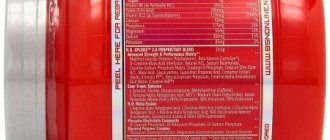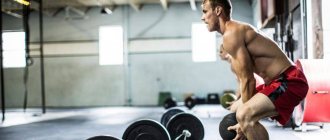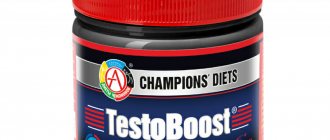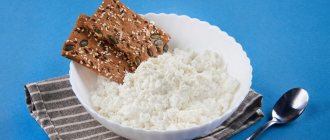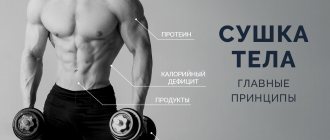When, how and what sports nutrition is best to take for weight gain? Learn how protein, creatine, BCAAs and other supplements affect recovery and growth.
When, how and what sports nutrition is best to take for weight gain
Even serious athletes often experience times when their progress in the gym slows down or stops. Or even worse – regression begins. Then you need an additional push for growth. Properly selected sports nutrition can help you get the desired results again.
Whey Protein for Muscle Gain
Protein is the basis of any sports nutrition regimen. The benefits of protein are obvious: it is convenient to take with you, it is easily digestible and effectively covers the body’s need for protein. Protein comes to the rescue in those moments when you don't have time to cook or just don't want to eat another chicken breast or steak.
The protein should be used at a specific time in the indicated dosage (dosage is calculated for an athlete weighing about 90 kg):
20 g immediately after waking up:
your body has been hungry for 8 hours or more, so it's wise to drink a protein shake as soon as you wake up. This will bring you out of the catabolic state and trigger muscle growth mechanisms. In the morning we don’t need complex carbohydrates or fats, just quickly digestible protein and some simple carbohydrates. The body will thank you for the influx of amino acids into the blood.
20 g pre-workout:
at this time the level of amino acids in the blood needs to be raised again. Taking protein before training will provide your muscles with an influx of amino acids throughout the workout, making the recovery process much more productive.
40 g post-workout:
at this time, the body needs quickly digestible protein and approximately twice as much simple carbohydrates (80 g). Drink this cocktail no later than half an hour after training. This will raise insulin levels, which will stimulate protein synthesis by transporting glucose and amino acids into muscle tissue.
How to take sports nutrition?
Sports supplements are used by both teenagers and older people according to their needs. After all, the sphere itself has long gone beyond just sports. Taking care of your health, treating illnesses, preventing injuries, increasing mental activity - sports nutrition products can do all this. We talked about the types of sports nutrition and their intended use above - check it out if you missed it.
In this chapter, we will discuss a number of common questions that trouble the minds of novice users and analyze them objectively. Let's also touch on the so-called myths about sports nutrition. Well, in order:
- Should I take sports nutrition regularly or not?
So, there are supplements where the course of administration is unlimited and those where they are clearly prescribed. If with the latter everything is more or less clear - take according to the recommendations and be healthy, then what to do with those where there are no exact recommendations?
The answer is simple: start from needs. As a rule, supplements without a specific course of administration are safe. These are proteins, gainers, amino acids, fitness nutrition, etc. That is, mixtures and products based on natural ingredients that the body needs daily.
If you are able to meet your nutritional needs from food, you can stop taking sports supplements. It makes sense to resume or continue taking it when there is an imbalance in the regularity and quality of nutrition.
- What happens if you stop taking supplements?
The answer is obvious: if you do not replace the intake of supplements with the intake of components with meals, then a rollback is inevitable. For example, you take 2 servings of protein per day. This way you get an additional approximately 50 grams of protein per day. From food - 100 g, in general - 150 g. A good ratio for a 75-80 kg athlete.
If you don’t change your diet and simply stop taking the protein mixture, your protein intake will begin to decrease by a third. This will lead to a loss of muscle mass, which simply will not be enough for 100 grams to maintain the existing muscle volume.
The situation is similar with vitamins and other dietary supplements: endurance and immunity decrease, fatigue increases, etc. Therefore, when deciding to stop taking sports nutrition, make changes to your current diet.
- How do I know how much sports nutrition I need?
Obviously, a 90-kilogram athlete and a 45-kilogram girl have significantly different nutritional needs. Therefore, it is not advisable to follow average standards. Find out the recommended limits based on weight, age and activity. Consult specialists on this matter. Try and listen to your body. For example, protein standards for a trainee are from 2 grams per kg of body weight. For an ordinary person, 1.2 - 1.5 grams is enough.
- How not to overdo it?
Follow the instructions for use and general recommendations. Be especially vigilant with stimulants: energy drinks, pre-workouts, fat burners, testosterone boosters and anabolic complexes. Exceeding dosages is fraught with health problems. When taking gainers, for example, follow the planned caloric intake (on average, 33 kcal per 1 kg of desired weight per day), otherwise there is a risk of becoming obese.
- What if I turn into a mountain of muscles?
As a rule, girls ask this question, not understanding that female physiology is different from male physiology. Gaining muscle mass is not easy for representatives of the opposite sex. Supplements like protein and amino acid complexes can help with this, but will not make you a muscular monster, even if you try hard.
Men, by the way, shouldn’t hope for a miracle either. Only hard work, nutrition and last but not least supplements will help you build the body of your dreams. The only exceptions may be test boosters and anabolic complexes. If you exceed recommended dosages, you will not gain muscle mass, but you may well cause problems with the hormonal system and muscle loss.
- it “stand”?
This same question is already purely male. And as old as this world. Experienced sports nutrition users smile indulgently when they hear something like this. Let's speculate. If you have added supplements to your diet that help meet the body's needs, then its functionality increases. With increased productivity, the functioning of all body systems, including sexual function, improves. So yes, there is a positive effect on potency. The main thing is not to overdo it with various hormone boosters, take them within the instructions, otherwise the effect may be the opposite.
Conclusion
At the end of the article, we note that there are many examples of people for whom taking sports nutrition did not bring any results. And this is a sad statistic. A lack of understanding of how the supplement works, the body, the basics of nutrition and training are the real reasons for the lack of progress (unless, of course, you have a specific disease that affects the result). We hope that after reading this article to the end, you will find important information in it that will help you progress and improve. Anabolism and health to everyone!
Creatine for strength gains
Creatine is an equally common sports supplement. It is converted into creatine phosphate in the muscles, which supplies them with energy during exercise. Creatine also promotes greater water flow into muscle cells, which leads to the creation of an anabolic environment for increased protein synthesis. This is the best supplement for gaining muscle mass and increasing strength.
3
–
5 g pre-workout:
This amount, taken with a small amount of complex carbohydrates and 20 grams of protein, will replenish the body's creatine stores.
3
–
5g post-workout:
Within half an hour of finishing your workout, take creatine along with 40g of whey protein and 80g of simple carbohydrates. You will receive a cocktail containing everything you need for further growth. After a workout, your muscles need nutrients - why not give them to him? The insulin spike from eating simple carbohydrates is guaranteed to send creatine directly into the muscles.
Useful article: “How to take creatine correctly? Reception, norm, effect"
Beneficial or harmful to the body
The majority of athletes take supplements to maintain physical fitness and endurance.
Some of them stop taking it after achieving the desired physical shape because they consider such drugs to be harmful.
However, in fact, dietary supplements do not harm the human body; they are only an addition to the diet. With increased physical activity, the body needs to replenish the lack of minerals and vitamins, and this is not easy to do.
What are the health benefits of supplements?
Nutritional supplements have more good qualities than contraindications. Beneficial substances include the following drugs: proteins, gainers, amino acids, vitamins:
- Taking dietary supplements accelerates the growth of muscle tissue. During active physical activity, muscle development requires a lot of protein, which is also important for restoring strength. Basically, athletes do not gain muscle mass because they do not consume the amount of protein required by the body.
- These supplements speed up the recovery process after high physical activity. This happens because when the body receives an increased amount of nutrients, muscle tissue recovery occurs much faster. Sports nutrition also improves the functioning of the immune and nervous systems.
- Dietary supplements promote muscle growth even with failures in the diet. Therefore, if you have a difficult diet that does not allow you to eat properly, nutritional supplements can be used to support the body.
Important! Gainers and proteins come in powder form, so you can simply pour them into a container and mix with water before use.
Contraindications
Each human body has its own individual characteristics, so it can react differently to any food product.
To eliminate the risk of side effects from nutritional supplements, you should consult with an experienced trainer or doctor before taking.
In most cases, problems arise from ignorance of the product being used. The main contraindications include:
- Diseases of the cardiovascular system. Dietary supplements containing caffeine should be avoided.
- Diabetes. For this pathology, substances high in carbohydrates are not recommended.
- Diseases of the gastrointestinal tract. It is necessary to exclude dietary supplements that contain amino acids.
Important! Experts do not recommend the use of dietary supplements for pregnant women and children under adolescence, as they can affect metabolism.
Side effects
The appearance of side effects from sports nutrition products is only possible if the drugs are taken incorrectly and unbalanced, and there is no division into gender.
Both for women and for men, excessive consumption of dietary supplements can cause the following pathologies:
- diarrhea;
- heartburn;
- redness and rashes on the skin;
- vomit;
- constipation;
- nausea;
- bloating.
All these problems can arise due to the abuse of these drugs or the manifestation of an individual reaction of the body. It should be understood that the same reactions from the gastrointestinal tract are possible when eating regular food.
Peculiarities of influence on men and women
Women use nutritional supplements to try to lose weight, men, on the contrary, to build muscle.
Therefore, the fair sex is recommended to use sports nutrition products that contain fat burners.
These remedies come in two types: thermogenetics and lipotrophics. However, in both cases, sports training is necessary to obtain the effect.
In the first case, during training, taking supplements increases body temperature, which leads to the “burning” of fat deposits. The second type of dietary supplement breaks down fat deposits and blocks new formation of fat cells in the liver.
Women should not take anabolic steroids, as they stimulate testosterone production. Such drugs disrupt hormonal levels, which can lead to serious disruptions in the functioning of the body. Read more about choosing sports nutrition for women.
Men should also be careful when taking anabolic steroids, as this may result in testicular cell death and sexual dysfunction.
To build muscle mass, the stronger sex needs to consume gainers; they contain a large amount of carbohydrates. You can add protein shakes to your diet; this combination will help you overcome the muscle building threshold.
It is also necessary to consume vitamin complexes, because during physical activity twice as many vitamins and minerals are consumed, and these products fully replenish the body’s need for nutrients.
The stronger sex should receive increased amounts of amino acids, creatine and L-carnitine. Amino acids are necessary to protect muscles from destruction and activation of anabolism.
The most common amino acids are BCAAs; they are used both for cutting and for gaining weight. Such products help maintain muscle volume and help accelerate fat burning.
Creatine is the most effective substance for building muscle. However, you should strictly follow the recommendations for taking this drug; if the permissible dosage is exceeded, it can cause dehydration.
Amino acids are necessary for the body to protect muscles from destruction and activate anabolism. L-carnitine not only promotes fat burning, but also at the same time builds high-quality muscles. This substance also reduces cholesterol levels in the body and has a beneficial effect on mental development.
The most dangerous dietary supplements for the body are testosterone production stimulants, which are often used by men to improve muscle definition. Such products lead to irreversible changes in the body: increased blood pressure, hormonal imbalance, and the risk of cardiovascular diseases.
Consumption of stimulants leads to a decrease in the body's independent production of hormones.
Casein for better recovery during sleep
Casein is a slowly digestible protein that will enter the bloodstream over a long period of time. Whey protein is used when the body urgently needs protein, while casein is needed in other cases: in between meals or when you have not been able to eat for a long time.
20 g post-workout:
Take 20 g of casein along with the rest of your sports nutrition. Whey protein will be quickly absorbed, and casein will feed the muscles with amino acids for a long time, which will lead to better recovery. It will also help you stay full until your next full meal.
20 g in the middle of the night:
Since casein digests slowly, you'll benefit from drinking a shake in the middle of your sleep. This way the body will receive the protein it needs for recovery. During sleep, the body is hungry and because of this falls into a state of catabolism. Taking casein about 3-4 hours after you go to bed will promote weight gain. So set your alarm!
Glutamine – an amino acid that promotes recovery
The effect of taking glutamine is not as noticeable as taking creatine, however, glutamine is not without its advantages. As one of the most abundant amino acids in the body, glutamine is actively involved in recovery by helping muscle cells store glycogen after exercise. It also helps increase growth hormone levels and supports immunity. In addition, glutamine reduces fatigue during training, so you can train longer at a high intensity. Glutamine is also needed for the functioning of the digestive system: if you do not take it additionally in the form of sports nutrition, the digestive system will take it from your muscle tissue.
7–10 g immediately after waking up:
should be taken along with a small portion of protein, as we wrote about above. This is necessary in order to bring the body out of the catabolic state in which it was at night.
7–10 g pre-workout:
this will allow you to train longer at high intensity.
7–10 g post-workout:
This will help glycogen flow into the muscles, which will put the body into an anabolic state and speed up recovery.
7–10 g 30–60 minutes before bedtime:
this will protect your muscles from breakdown while you sleep. Together with a small dose of catabolism, this will prevent catabolism.
conclusions
When asked about the choice and possibility of using supplements, the easiest way for a sports nutrition store salesperson is to say “consult your doctor.” However, given the level of education of doctors in the field of sports drugs, it is unlikely that a person should seriously expect a competent and reasoned answer from them. Most doctors just say, “It’s not worth it,” “I don’t recommend it.” For them, the main thing is “no matter what happens,” so that there are no complaints against them later. Therefore, the athlete is forced to search for the truth and answers on his own. This is not difficult to do, the main thing is not to be captured by stereotypes about the mythical dangers of sports nutrition. And avoid making very common mistakes when the cause of unpleasant symptoms is not the supplements, but their incorrect choice or administration.
Also, you should not choose the place of purchase according to the principle “where is cheaper”. Considering the cost of imported sports nutrition, it is quite possible to run into a counterfeit or expired product with a missed production date. Typically, the small savings are not worth the risk.
Any new supplement should be taken gradually, starting with minimal dosages. The ideal option would be to purchase small packages to evaluate the taste and reaction of the body.
Author
BCAAs for restoration and reduction of catabolism
Leucine, isoleucine and valine, which are part of BCAAs, are used as fuel during intense training. They protect your hard-earned muscles from breaking down. The rest of the time, BCAAs perform other useful functions: improve protein synthesis and reduce the level of the catabolic hormone cortisol.
5–10 g immediately after waking up:
Taking BCAAs in the morning helps get rid of catabolism after an overnight fast. The body will use BCAAs for energy, and the protein and glutamine will fuel muscle tissue.
5–10 g pre-workout:
this will help supply the body with energy and protect muscle tissue from breakdown. You will trigger the anabolic processes necessary for growth.
5–10 g post-workout:
this will increase protein synthesis and suppress the production of the catabolic hormone cortisol, which causes muscle loss and limits the effect of testosterone on muscle growth.
Protein and gainer: what is it, harm and benefit
Gainer is the same as protein, only it contains a high amount of carbohydrates and is very high in calories. The average product contains about 80 grams of carbohydrates per serving and 30 grams of protein. Most gainers contain a large amount of vitamins and minerals. This is an ideal choice for athletes looking to gain mass - this is the main benefit of sports nutrition. The harm and possible danger of a gainer is that due to excess carbohydrates, it is possible to gain not only muscle tissue, but also a significant layer of fat. This possibility is especially great if the training is low-intensity - in this case, carbohydrates from the gainer will go straight to fat reserves.
Whey protein is a versatile supplement that contains about 24 grams of protein and about 10 grams of carbohydrates per serving. Some manufacturers supply the market with pure protein without any admixture of carbohydrates and fats - such a product is more expensive, but it has more benefits. The harm of sports protein nutrition lies in the possibility of toxic effects on the kidneys. People with diseases of the urinary system are allowed to take protein supplements only after consultation with a nephrologist.
Arginine to improve blood supply to muscles
Arginine is converted in the body to nitric oxide (NO). This is a supplement with many beneficial properties. Arginine increases blood flow to muscles by allowing more nutrients (amino acids and glucose) as well as hormones such as growth hormone, testosterone and insulin-like growth factor (IGF-1) to enter the blood vessels. Also, greater water flow into muscle cells increases protein synthesis, which leads to rapid muscle growth.
2–3 g immediately after waking up:
At this time, arginine will dilate blood vessels, which will improve the flow of other nutrients into the muscles.
2–3 g pre-workout:
this will increase natural growth hormone production before exercise.
2–3 g 30–60 minutes before bedtime:
this will also help increase growth hormone levels.
Vitamins and Antioxidants for Better Health
Antioxidants help the body get rid of free radicals that are formed during stressful periods, such as after strength training. You should take vitamins C and E to cope with stress and maintain the body in a state of anabolism.
500 mg vitamin C with post-workout meal:
Vitamin C helps maintain healthy joints and supports immune function.
150–300 mg of vitamin E with your post-workout meal:
Vitamin E reduces muscle cell damage and improves recovery. This antioxidant is also important for the condition of the skin, nails and hair.




